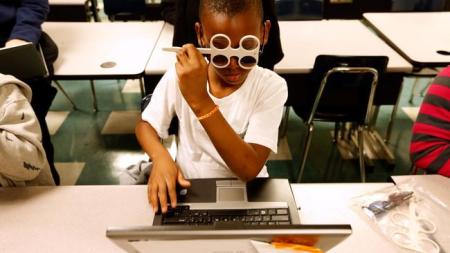
Shavalo Wooley, 8, uses 3-D glasses along with magnifying glasses while participating in a new program to improve children’s reading skills by addressing problems with eye movement during the reading process at La Salle Avenue Elementary School in Los Angeles in March. (Genaro Molina / Los Angeles Times)
By Sonali Kohli, Los Angeles Times, December 5, 2017
Too many California children can’t read, and the state doesn’t have an adequate plan to fix the problem, according to a lawsuit filed Tuesday.
The complaint, filed in Los Angeles County Superior Court by the advocacy law firm Public Counsel, alleges that the state is not meeting its constitutional responsibility to educate all children.
California lags behind the national average in both reading and writing for fourth- and eighth-graders, according to national education data.
California scores below average on a national reading assessment (U.S. Department of Education)
About five years ago, the state superintendent and state board of education president commissioned a report with suggestions to improve literacy in California. The state has not adopted or implemented an adequate plan based on those suggestions, the lawsuit alleges.
In recent statewide English assessments, fewer than half of California students met the state’s literacy standards for their grade. The lawsuit cites the case of Los Angeles Unified School District’s La Salle Elementary, where fewer than 10 of 179 tested pupils met state English standards this year.
“This is in full view of the state,” said Public Counsel lawyer Mark Rosenbaum. “They haven’t done anything in terms of working with the district or working with the school to address a problem that has …persisted year after year after year.”
The plaintiffs are current and former students and teachers at La Salle Elementary School; Van Buren Elementary School, in Stockton; and the charter school Children of Promise Preparatory Academy, in Inglewood. The lawsuit places the onus of responsibility on the state, rather than the districts, because the problem spans schools throughout California, Rosenbaum said.
David Moch, one of the plaintiffs and a retired teacher who taught at La Salle Elementary for 18 years until 2014, said he sometimes used kindergarten reading tools to help children as high as third and fifth grade. Some of the programs the district instituted did help older students learn to read, he said, but they were not long-term programs.
“We need citizens that can read. We need citizens that can vote,” Moch said. “Once you get behind, if there’s no intervention, there’s no catching up. The level of the work is getting more intense and multiplied at every level.”
The complaint calls for better teacher training and more resources for teachers. It also demands that once students are identified as having difficulty reading, the state help schools to implement “proven methods of literacy instruction,” said Rosenbaum, who filed the lawsuit along with law firm Morrison & Foerster.
The state does not have a current plan in place that assesses each school’s literacy instruction, Rosenbaum said. “There’s no accountability system in place to ensure that literacy is being delivered.”
California Department of Education spokesman Robert Oakes declined to comment on the lawsuit, but said in an email that the state allocates additional funding for high-needs students and makes data available for “school communities” to use in the “targeting of resources.”
Leave a comment